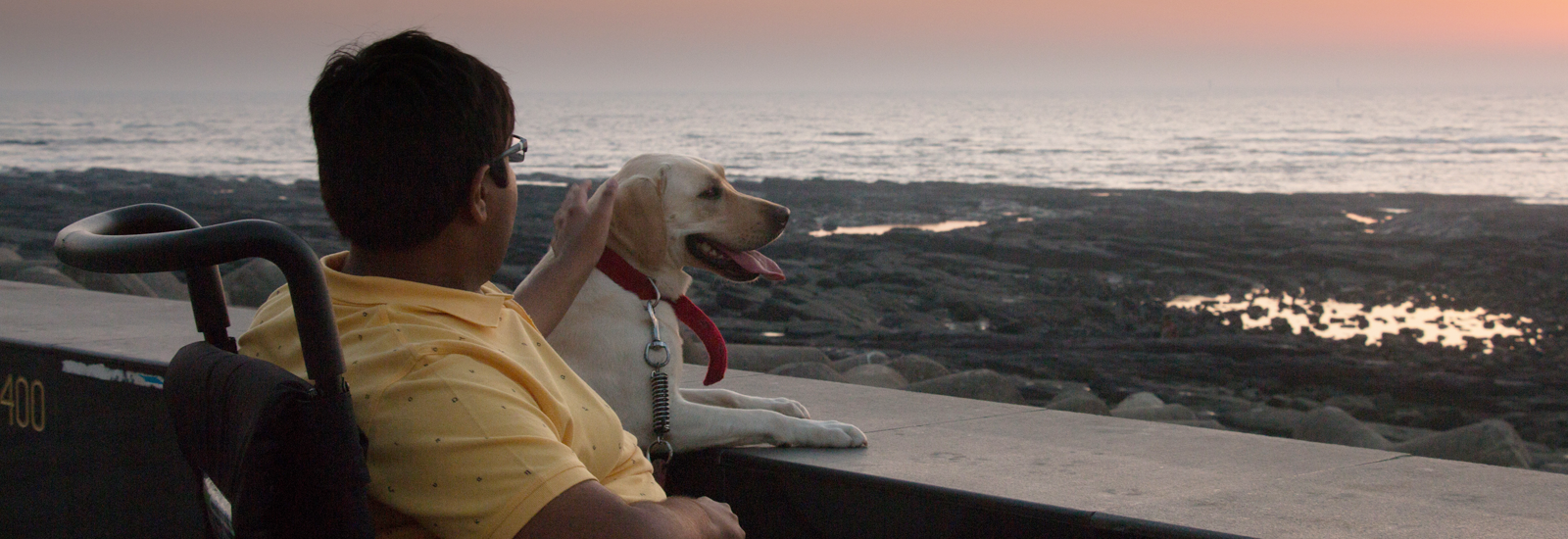
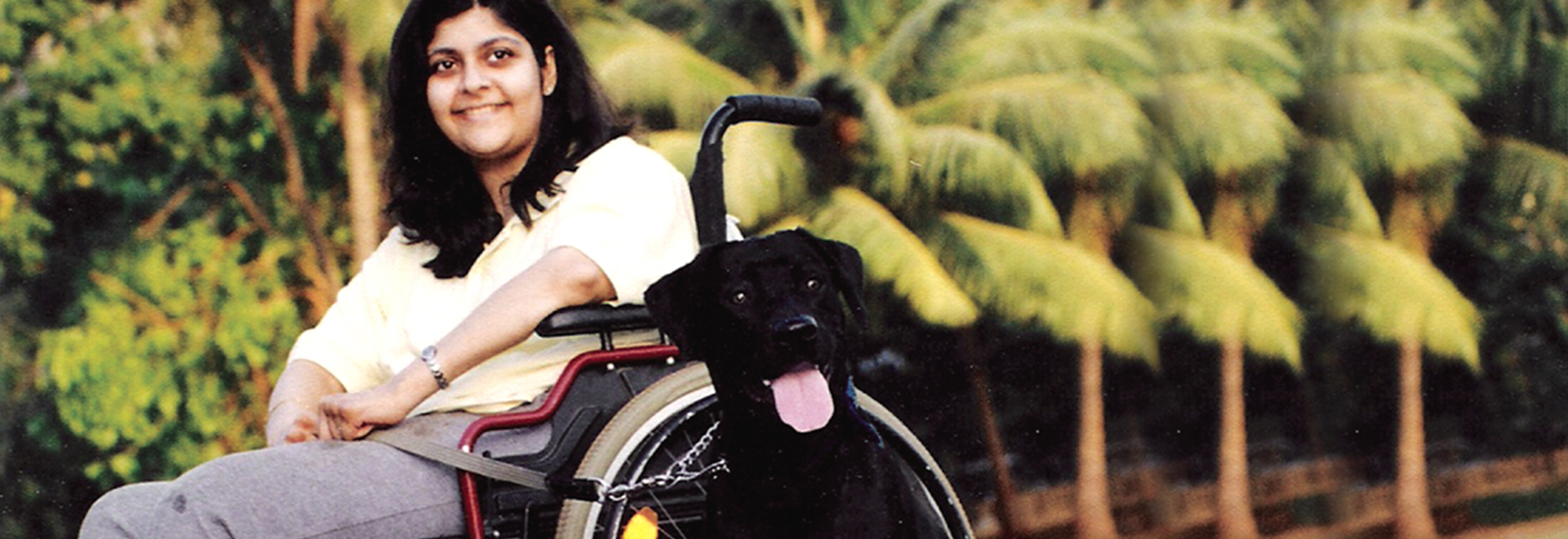
It was in 1999 when the Kargil war inspired me to do something for the soldiers who were rendered physically challenged whilst fighting for their country. My mentor, John Rogerson had helped set up Dog Aid (a service dog organisation) in England and I knew the intricacies of training Assistance Dogs.
Dogs are man’s best friend; and Service Dogs are truly special. Whether they guide the blind, assist the disabled or help the deaf to hear – they all share a mission – to aid people in need. These dogs give back the self-esteem and independence that a disability takes away from them.
Statistics say, India’s disabled population runs into lakhs. I say, a dog can help many of these people live more independent and meaningful lives.
And so, with my 6 year old adopted Labrador Honey, we worked on the specialised training and set out to introduce the concept of Assistance Dogs in India.
“Impossible! Ridiculous! The girl has lost her mind!” Were the retorts I got. But I held firmly to what I believed in – and knew – that dogs can make a difference. And with a little help from Honey, we showed India how it could be done. Over 2 decades later, things have changed; the resistance has been replaced with acceptance. And today, people do believe that canines can care, we just have to give them the chance.
– Shirin Merchant
Our Stories
Magic
Sanam Karunakar was a normal teenager involved with college and other activities, looking forward to a promising career. One unfortunate day she was involved in a car accident, which claimed both her parents and left her paralysed from the chest down. She is now confined to a wheel chair. However even with all her problems she is always sunny and cheerful and is trying to live with her disability as best as she can.
Magic offered Sanam a life of independence and dignity. He remained by her side for the rest of his life as a true and loyal companion, not expecting anything in return - just love.
Shirin Merchant
Founder, Canines Can Care
Magic
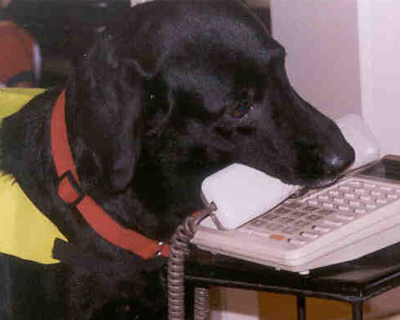
My life changed the day I lost my parents and woke up in a hospital. When the whirlwind of operations, doctors and physiotherapy ended, I was faced with having to re-evaluate my entire way of life. Living with a disability is an endless struggle to perform even the simplest of tasks. For most people, dropping a pen is an inconsequential event. When you are seated in a wheelchair, with limited mobility, the pen is often out of reach. Being forced to constantly ask for assistance of others is depressing, especially when I used to be so active before.
I had resigned myself to this dependant lifestyle, till one day I got a call from ‘Canines Can Care’. A beautiful black Labrador puppy had been donated to the organisation and they wanted to know if I was interested in an Assistance Dog. Until then I had only seen Assistance Dogs on television and would have loved to have one but I was not aware that this was possible in India. When ‘Canines Can Care’ approached me and offered me the puppy, I was thrilled! I knew right then that I definitely wanted him.
The day Magic, my Assistance Dog in training, entered my life the world became a sunnier place to live in. He became my companion when I was alone, my laughter when I was sad and most importantly he became my best friend. I always referred to him as my "Magic’al Angel" because that’s what he was for me.
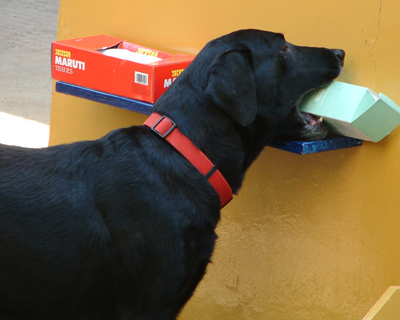
The first time I saw him, I fell in love. He brought immense happiness and love into my life. He did not judge me for what I could or couldn’t do, Magic just loved me unconditionally. Sometimes when the two of us were home alone, he would just sit by my side and keep me company. When I was sad he licked away wounds no one could see and his gentle spirit calmed and comforted me. He brought back confidence and hope, once lost, and since the day I got him, I knew nothing was going to be the same again.
‘Canines Can Care’ gave Magic to me with a purpose. He helped me live my life independently; independence is something extremely precious to a disabled person. Magic knew my needs so well that sometimes when I dropped something, he would just hear it fall and fetch it without being given a command. He was so smart that there were times when he wanted a treat and a hug, he purposely would drop an item and then would ask for a reward for fetching it.
It was so easy and so much fun training Magic as all his training was done using toys and food as motivation and we both thoroughly enjoyed every day. I still remember when Canines Can Care got Magic to meet me on the first day; he was a frivolous five-month-old pup. I would wonder how we were ever going to calm him down as he was always running around. Now, when I look back I can just see how much my Magic achieved over the years and how he transformed himself just to make me happy. This is what I think unconditional love is.
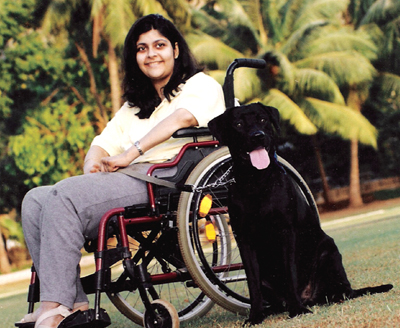
Magic was not just an Assist Dog to me; he was my best friend too. He knew all my secrets and I could depend on him completely. He was so protective of me that when we both were home alone and if a person came to the door, he would bark to alert me. This gave me a sense of independence as I knew I could trust his instinct.
Magic gave me a new reason to live. We went out to different places and met wonderful people. Having him near me, made more people come and talk to me and that made me feel accepted.
I am indebted to ‘Canines Can Care’ for helping me turn my life around. I truly believe that many other wheelchair bound people in India can benefit from an Assistance Dog, just as I did.
I lost so much and felt so depressed and miserable and lonely for so long –till a Magical Angel bounded into my life and changed it. The love and trust he brought into my life will stay with me forever.
Magic was India’s first certified Assistance Dog. He lived with Sanam from till . He had a very happy life with her.
Angel
Allen Saunders once said –
‘Life is what happens to you while you're busy making other plans.’
And that couldn’t be truer for Karan Shah. Afflicted with Spinal Muscular Atrophy, Karan and his brother Mihir both grew up confined to wheelchairs. People suffering from the disease have little muscle tone, weak muscles and feeding and breathing problems. The disease progressively gets worse over a period of time."My brother, Mihir died suddenly when he was just 15 years old," says Karan. "He didn’t give me a chance to say good bye or tell him how much I loved him. Just the day before his death, Mihir and I were playing innocently, not knowing what lay ahead. A day later, he died in my father’s arms."
Angel
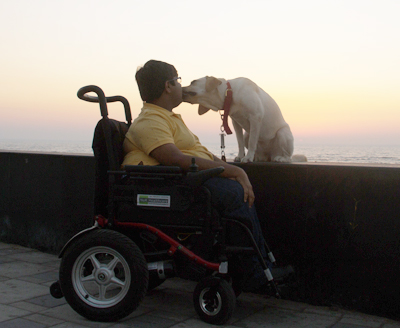
"My brother, Mihir died suddenly when he was just 15 years old," says Karan. "He didn’t give me a chance to say good bye or tell him how much I loved him. Just the day before his death, Mihir and I were playing innocently, not knowing what lay ahead. A day later, he died in my father’s arms."
Mihir’s passing away left Karan in a state of utter shock and disbelief. "The loss was too much for me to bear and I sank into a dark hole of depression," remembers Karan. "He was more than just a brother to me – he was my best friend. I didn’t know how to carry on with my life."
That all changed the day a friend gifted the family an adorable cuddly little Labrador puppy. Karan’s mother refused to have a dog at home and insisted on giving it away. But Karan was having none of that. And so, Angel came into their lives and home. She brought chaos with her – she chewed up the furniture, chased Karan’s mother, toileted all over the house and even tried to chew the wheelchair up! But Karan loved her with all his heart.
"Angel’s presence in my life, changed me into a better person," states Karan, happily. "She made me calmer, loving and I feel happy and satisfied with life." But Karan felt something was missing. That is when he decided to approach India’s only assistance dog organisation - Canines Can Care and train Angel as an assistance dog.
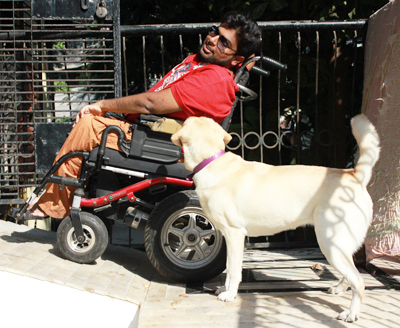
It is very difficult for an able-bodied person to imagine the plight of a physically handicapped person. Trivial daily tasks which we take for granted like picking up a fallen object or opening a door present a daunting challenge to the handicapped. With most disabilities the person suffers from a limited use of their hands, feet and fingers. This is where an assistance dog can aid the person in being independent. A fully trained assistance dog can understand up to 50 commands. All training is done through reward based methods.
And so, Angel’s training started. A year later, Angel can retrieve dropped objects, locate and retrieve a phone when it rings, turn on a light switch, pick up items and put them in a dustbin, open and close doors, alert Karan’s mother in an emergency, help Karan undress, fetch his shoes from a drawer and she gently climbs up on the wheelchair step to say hello and get a cuddle, instead of leaping at Karan. Teaching her to walk on the leash, forced Karan to use dormant muscles and taught him how to balance. But most importantly, she is Karan’s best friend and constant companion.
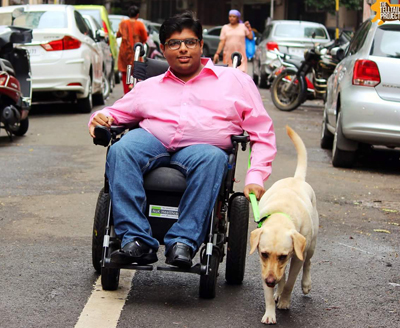
India has a huge population of physically challenged people – most of whom have a raw deal – they are discouraged from using public transport, getting a job of choice, going for a movie or stepping out into public for fear of being stared at. Due to this many feel socially isolated, depressed, useless and inferior.
Studies have been conducted which show that when a disabled person is paired with an assistance dog, the physical aspect of the relationship is not the only part that benefits. Through the pairing, a strong emotional bond often forms between the human and canine. As a consequence of this bond, many areas of the owner’s well being are enhanced, making that person grow in self-esteem, confidence, independence, and cheerfulness.
The dogs provide a vehicle for people to see past the disability and see disabled people as human beings with feelings.
"I don’t know what life holds for me," says Karan, softly. "But with Angel by my side, I know I can accomplish anything. Dogs like Angel have helped people in India believe that canines can make a difference in our lives; we just have to give them the chance."
What Do Our Assistance Dogs Do?
Since 1996, our Mumbai based unit, CANINES CAN CARE has worked to train dogs to aid individuals who are physically challenged. They help the handicapped to achieve their desire to be independent by performing tasks that are physically demanding.
It is very difficult for an able-bodied person to imagine the plight of a physically handicapped person. Trivial daily tasks which we take for granted like picking up a fallen object or opening a door present a daunting challenge to the handicapped. This is where an assist dog can aid the person in being independent. A fully trained assist dog can understand up to fifty commands. A few of the tasks they can carry out are listed below.
Picking Up Dropped Objects
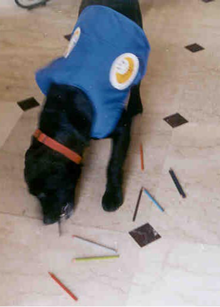
With most disabilities the person suffers from a limited use of their hands, feet and fingers. In many cases the person is unable to close his fist or to grasp an object or bend over, making the simplest of tasks frustrating and incapable. For example, take a task as simple as picking up a dropped pen. An able bodied person would normally just bend over and pick up the pen without much thought. But a disabled person would find it impossible and would have to call for assistance.
Being forced to constantly ask for assistance can easily lead to a life of dependence and loss of self-esteem.
The dogs that graduate from Canines Can Care are specially trained to retrieve any item dropped by the owner. They can reach under wheelchairs, tables and beds to pick up the dropped item and place it on the person’s lap.
Dropping Articles In a Waste Paper Basket
An assist dog can also help the disabled person at work. It spares the disabled the embarrassment of constantly being tidied up after. The specially trained dogs are taught to pick up anything the owner asks and then deposit it in the basket.
Fetch A Telephone
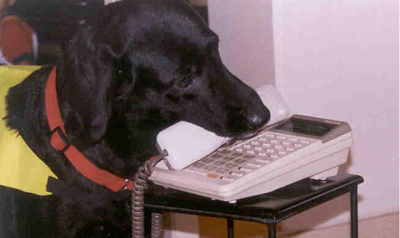
Disabled people often cannot get to a ringing telephone on time before the caller hangs up. The dog in such cases is of valuable assistance especially if the person is alone at home and is in immediate need of assistance.
The dogs are trained to go to a ringing telephone and bring it to the owner; they are also taught to find a ringing mobile phone and bring it to the owner.
Speak On Command To Alert Of An Intruder / Or Barking For Help
While assist dogs are NEVER “attack trained” the dogs are taught to speak on command. A disabled person alone can be a target for thieves and anti-social elements. The dog acts as a deterrent to people who intend to harm the disabled person. In case of a threat or emergency the dog stays close to his owner and barks till help arrives.
Covering The Owner With a Blanket
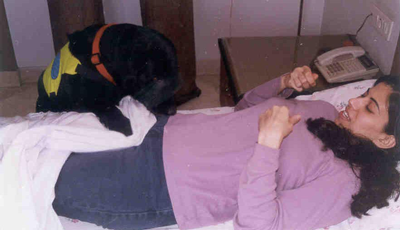
It is difficult for a disabled person to bend over and cover himself with a blanket. The dog not only covers the person but is also at hand if the disabled person gets up at night.
Getting Help In An Emergency
One of the most valuable commands an assist dog learns is that when the owner is in trouble to go and get help from another person. This command is useful in saving a disabled person’s life in case of an emergency.
Loading And Unloading Washing Machine
The dog can unload a laundry basket for the disabled person and also unload clean clothes from a dryer and either put them in a basket or hand them over to the owner.
Switching On And Off Light Switches
It can be potentially dangerous for a disabled person to enter a dark house alone and stumble over an object, it is helpful if the dog enters first and puts on the light switch.
Fetching Items From a Cupboard, Shelf, Refrigerator Or a Drawer
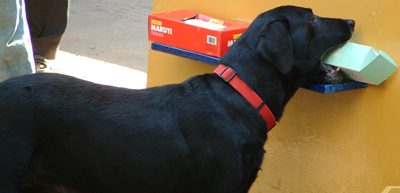
Many disabled people find stretching, bending and carrying difficult. Wheelchair users in particular often find that their chairs won’t allow them close enough to household appliances. The dog can open cupboards and drawers and fetch items within them for its owner.
Acting As a Support
If the disabled person falls down and there is no one around to help him get up then the dog stands still and the person can push himself up by leaning on the dog.
Opening And Closing Doors
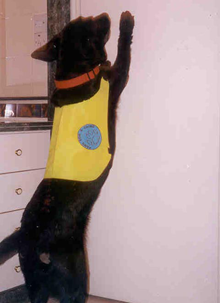
Unless the disabled person has a helper around it is virtually impossible for him to have access to all areas. For a quadriplegic, a heavy commercial door might as well be locked if there is no one around to open it.
Many a time a disabled person is stranded in a narrow corridor because they cannot reach sideways to open the door or when a door opens inwards. The usefulness of having a trained dog around to open and close doors gives the disabled person the freedom to move around the house and in public places.
Carrying Items From One Person To Another
It relieves stress on the family members of the disabled person if a trained dog is around to help with simple tasks such as carrying medicine, food items, and other daily necessities to and from the disabled person to a family member or friend. The dog can also carry a message to the kitchen and return with object requested, such as food.
Assistance Dog FAQs
An Assistance Dog is one who has been specially selected, raised and trained to help a person with a physical disability. The dog is trained to retrieve objects that are out of reach, open and close doors, switch on and switch off lights, bark for help, get the telephone and perform many other tasks which are difficult for a physically challenged person. These wonderful dogs also offer a lifetime of unconditional love and companionship to the physically challenged person.
An Assistance Dog’s job is to make a disabled individual more able, not to protect him.
The dog’s presence is a natural deterrent. Because disabled people take their Assistance Dogs into public places and many are not able to physically restrain their dogs, the Assistance Dog must be safe for the public. In addition, if the dog is protective about its partner, in an emergency, (for example, if the person is unconscious) the dog will not allow medical personnel to give immediate aid to the disabled person, nullifying its very purpose to assist its partner.
“Canines Can Care” (CCC) is India’s only organisation that trains and places Assistance Dogs.
Unfortunately, in India, restaurants, theatres, supermarkets and other public places are not “friendly” towards the physically challenged. That is the reason why you seldom see a physically challenged person out in public- with or without an Assistance Dog. If enough people got together and urged the politicians to introduce new laws and change existing ones, we could see Assistance Dogs being allowed into public areas some day.
“Canines Can Care” obtains its dogs from a variety of sources varying from reputable breeders to rescued stray dogs. However, Golden Retrievers and Labrador Retrievers are the dogs of choice because of their size, natural desire to work with people, strong retrieving instinct, forgiving nature and their friendly disposition.
It is important to note that “Canines Can Care” evaluates the dogs for temperament, retrieving ability and general behaviour before selecting them. The organisation will use either sex of dog. All dogs are neutered in any case, so that their working behaviour is not affected by hormonal changes.
“Canines Can Care” obtains its dogs from a variety of sources varying from reputable breeders to rescued stray dogs. However, Golden Retrievers and Labrador Retrievers are the dogs of choice because of their size, natural desire to work with people, strong retrieving instinct, forgiving nature and their friendly disposition.
It is important to note that “Canines Can Care” evaluates the dogs for temperament, retrieving ability and general behaviour before selecting them. The organisation will use either sex of dog. All dogs are neutered in any case, so that their working behaviour is not affected by hormonal changes.
A puppy needs lots of love and attention to develop into a happy, healthy Assistance Dog. A “Puppy Raiser” is one who raises, socialises and brings up a puppy for approximately the first year of its life, after which the dog is returned back to the organisation for advanced training. The time, effort and love given to a puppy by a Puppy Raiser are vital for the puppy to grow into a mature, dependable and trustworthy companion for a person with a physical disability.
Advanced training takes between six months to one year and is provided by senior “Canines Can Care” trainers.
Most people who want to train Assistance Dogs love and own dogs but have no previous training knowledge. A person needs an intricate knowledge of training and canine behaviour, not to mention a lot of patience to train a dog in specialised tasks. Having trained your own pet dog does not immediately qualify you to be a trainer. A common misconception about the assistance dog field is that it’s about dogs. In reality it’s about helping people, which is why the trainer also needs to be great at communicating with humans.
The organisation runs courses on dog training, after which a candidate can apply for the post of Assistance Dog trainer.
